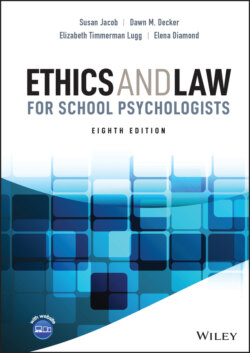Читать книгу Ethics and Law for School Psychologists - Susan Jacob - Страница 73
The First and Fourth Amendments
ОглавлениеIn 1969, the Supreme Court decided an important case concerning student rights in the public schools, Tinker v. Des Moines Independent Community School District. This case involved three students who were suspended from school for violating a school policy prohibiting students from wearing black armbands in protest of the war in Vietnam. In Tinker, the Court recognized the need to balance the school’s interest in maintaining discipline in order to foster learning and the fundamental personal freedoms guaranteed citizens in the Bill of Rights. In the Court’s view, the school’s policy of banning armbands was an unreasonable violation of the students’ constitutional right to freedom of expression because there was no evidence that the silent wearing of armbands interfered with or disrupted the functioning of the school.
Thus, although children in the school setting are not afforded the full range of personal freedoms guaranteed citizens by the Bill of Rights, they do maintain certain fundamental rights in the school setting. In Tinker, the Court stated that “students in school as well as out of school are ‘persons’ under our Constitution … possessed of fundamental rights which the State must respect” (p. 511). Students do not “shed their constitutional rights to freedom of speech or expression at the schoolyard gate” (p. 507).
